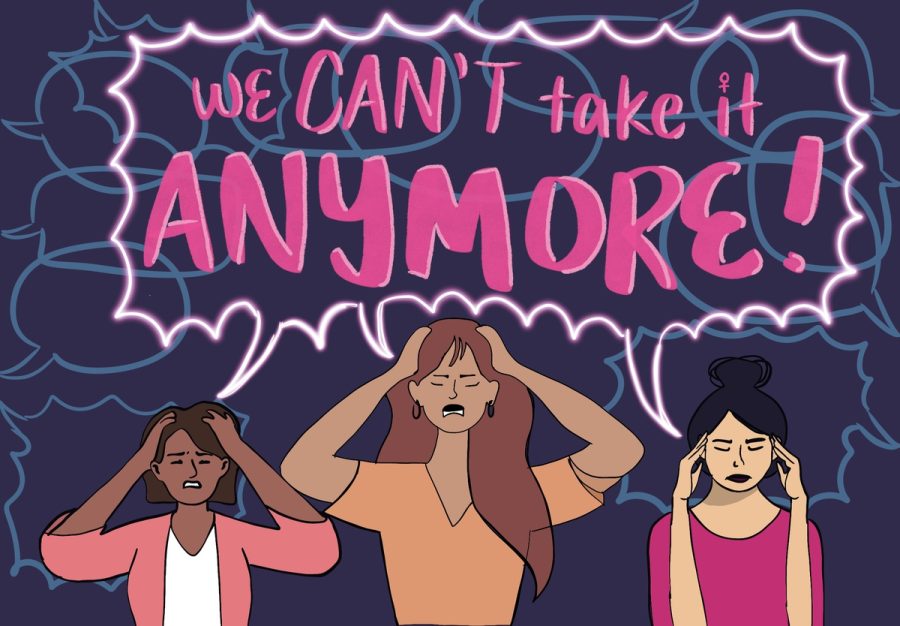In our experience, which correlates with plenty of other women that we know, being around a group of men as a female minority often creates an unwelcoming and hostile — and sometimes even wounding — environment.
The hyper-masculinity.
The careless discussion of women’s appearances.
The locker room talk.
The lack of sensitivity and indifference to anything that does not affect them directly.
The constant ironic depreciation and belittling of women.
And just a general sense of exclusivity and collective egotism — implicitly asserting superiority over women.
Men bond through these means, creating community by continually declaring their strength, manliness, and dominance through denying the natural parts of themselves which are traditionally viewed as feminine — the parts which encourage them, as humans, to be thoughtful, empathetic, and sensitive.
With this, the ability to recognize a woman’s worth — her humanity even — is sacrificed, prompting an environment of discomfort and uneasiness when women are among groups of men.
Our femininity is no match for the untouchable, unquestionable masculine bonds between men.
This notion materializes before us every single day, likely occurring way more than you consciously recognize.
In my freshman and sophomore year, a lot of the misogyny I witnessed and experienced was extremely blunt and unfiltered — usually occurring in the form of a joke.
“Go make me a sandwich” or “get back in the kitchen” were statements I heard often, followed by an eruption of laughter. For a while, I laughed too, thinking the sarcastic nature of the joke made it harmless.
I was wrong, of course. Looking back now, I can see that. Ironic sexism is merely a ploy to escape accountability.
Nonetheless, these comments persisted, to the point where they became ordinary — not even warranting a reaction from the girls — yet the wall of laughter remained. I didn’t understand: how were my male friends and acquaintances still so utterly amused?
It wasn’t until a year or so later that I realized what was going on. The countless comments were a collective assertion of masculinity, attempting to secure their subconscious desire for male superiority through repeated, communal remarks. It didn’t matter whether or not they received a satisfying outburst from their female counterparts; the validation from their friends was enough to protect their sense of power.
Despite taking a more subtle form, this still rings true in my friendships with men today, even three years of growth and maturity later.
Especially this year, groups of men have banded together and created an exclusive culture of “the boys” — heavily worshiping one another and celebrating their masculinity.
They automatically applaud what “the boys” are saying or doing, even when it is wrong and/or misogynistic.
In my experience, there have been countless times in which men at La Salle have treated women with such an utter lack of respect, usually in a romantic sense, and time and time again, their friends either defend, rationalize, or remain silent.
Why? Because if someone were to speak up and hold their friends accountable for their treatment of women, it would threaten the very foundation of their friendship.
So, men allow these things to slide, authorizing the crude behavior to flourish and consequently, sacrificing women’s wellbeing — making us feel insecure and small.
The fact that men can maintain a sense of superiority solely through interacting with other men is terrifying.
Thus, instilling a desire in men to change can be extremely challenging, since their prideful masculinity can immediately be reaffirmed when they gather with their friends, despite any prior degree of confrontation from women.
If a girl, in a group of boys, were to speak up or seem bothered by a hurtful comment, we’d be met with knowingly confrontational questions: “Why aren’t you laughing?” or “Are you bothered?”
Or my personal least favorite: “Uh-oh, she’s gonna get mad” As if our presence to these misogynistic comments are ruining boys’ fun.
When boys are together, the masculinity that they’ve been socialized to celebrate is safe-guarded by one another — creating a culture of power and dominance.
Meanwhile, many women possess the deeply passionate devotion to change the status quo, but lack the necessary systemic power to do so.
So, men’s involvement is imperative in changing these power dynamics, but so long as masculinity is the basis of men’s friendships, that seems like an unlikely reality.
We need to deconstruct these patterns, and rebuild in a way that women are valued for their humanity.
Here’s the thing: men have the choice as to whether or not to subscribe to this kind of friendship.
For those who chose to participate, they do so at the expense of women — and I’d argue, at the expense of themselves.
And those who don’t are too often ridiculed, subtly casted as a weak social pariah, simply for rejecting masculinity as the foundation of their friendship.
It’s a dangerous, harmful culture, and one that so desperately needs to be revised.
It is one that overpowers women’s voices, time and time again. We are drained, getting to the point where surrendering to the ill-treatment feels more palatable than fighting against it.
Stomaching the pain is less exhausting than being portrayed as delicate. Or hypersensitive. Irritable. Dramatic.
Accepting our fate as subordinates feels more productive than explaining — for the millionth time — how certain behaviors are riddled with misogyny.
We are desperately calling for men to reflect on how their friendships bolster oppressive gender dynamics.
Male friendships do not need to be a performance of masculinity. But too often, they are — fueled by the dominance of the “bros.”
Women are suffering. It is time for a change.




Shruthi Vegesna • May 27, 2024 at 11:12 am
Brilliant, absolutely accurate description . Thank you so much for articulating it so well . I’m from India and the level of patriarchy here is extreme . I resonated so well and shared this article with many people I know . I keep on trying my bit for gender equality whenever possible and want to make the world a better place for my daughter.
Kamryn Houghton • May 29, 2023 at 11:34 pm
Ladies thank you for this insightful article. You share the pain of many and motivate men in a positive way. Great work! I loved it!
Chris Krantz • May 25, 2023 at 3:04 pm
Wow!
There is so much to think about and talk about in this article. It truly deserves a full-unpacking (and with your permission, Clare and Maya, I’d like to include it in our class discussions of Things Fall Apart and Pedro Paramo next year). One of the important points you make with regard to Bro Culture resonates deeply: “When boys are together, the masculinity that they’ve been socialized to celebrate is safe-guarded by one another — creating a culture of power and dominance.” I have experienced this at every level of life (and I hate to tell you now that you’re leaving La Salle, I saw it at its worst in college). And it’s easy to see why it exists. Given the patriarchal constructs that have existed for thousands of years, it’s no wonder that so many men are so ill-equipped to do the kind of self-reflection and public examining that is required to make us more “thoughtful, empathetic, and sensitive people.”
On a personal note, I grew up in a house with four brothers and a father steeped in the patriarchal mythology of the Canadian cowboy. Our mother passed away when we were just kids. Let me tell you, it took years, if not decades–and the influence of many kind and brilliant women–to shed the imprint of the kind of patriarchal thinking to which your article alludes. I wish I had had sisters like you two, Maya and Clare; I’m sure I would have learned to be a much better human being so much earlier in life. Once again, perhaps for the last time, we thank you for such exemplary work. You make us all proud.
Ella Wedin • May 24, 2023 at 11:47 pm
this is so powerful you guys, I throughly enjoyed reading this and I hope that the rest of our community reads it as well.